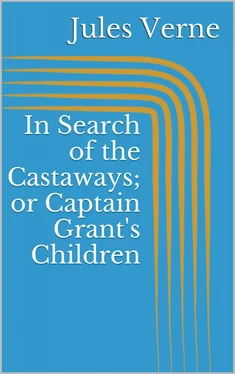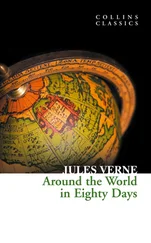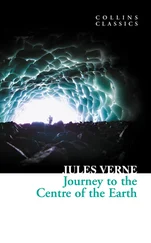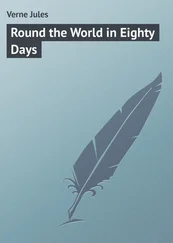For the first three or four hours—that is to say, for about sixty to eighty miles, as far as Cape Gregory—the coast on either side was low and sandy. Jacques Paganel would not lose a single point of view, nor a single detail of the straits. It would scarcely take thirty-six hours to go through them, and the moving panorama on both sides, seen in all the clearness and glory of the light of a southern sun, was well worth the trouble of looking at and admiring. On the Terra del Fuego side, a few wretched-looking creatures were wandering about on the rocks, but on the other side not a solitary inhabitant was visible.
Paganel was so vexed at not being able to catch a glimpse of any Patagonians, that his companions were quite amused at him. He would insist that Patagonia without Patagonians was not Patagonia at all.
But Glenarvan replied:
"Patience, my worthy geographer. We shall see the Patagonians yet."
"I am not sure of it."
"But there is such a people, anyhow," said Lady Helena.
"I doubt it much, madam, since I don't see them."
"But surely the very name Patagonia, which means 'great feet' in Spanish, would not have been given to imaginary beings." "Oh, the name is nothing," said Paganel, who was arguing simply for the sake of arguing. "And besides, to speak the truth, we are not sure if that is their name."
"What an idea!" exclaimed Glenarvan. "Did you know that, Major?"
"No," replied McNabbs, "and wouldn't give a Scotch pound-note for the information."
"You shall hear it, however, Major Indifferent. Though Magellan called the natives Patagonians, the Fuegians called them Tiremenen, the Chilians Caucalhues, the colonists of Carmen Tehuelches, the Araucans Huiliches; Bougainville gives them the name of Chauha, and Falkner that of Tehuelhets. The name they give themselves is Inaken. Now, tell me then, how would you recognize them? Indeed, is it likely that a people with so many names has any actual existence?"
"That's a queer argument, certainly," said Lady Helena.
"Well, let us admit it," said her husband, "but our friend Paganel must own that even if there are doubts about the name of the race there is none about their size."
"Indeed, I will never own anything so outrageous as that," replied Paganel.
"They are tall," said Glenarvan.
"I don't know that."
"Are they little, then?" asked Lady Helena.
"No one can affirm that they are."
"About the average, then?" said McNabbs.
"I don't know that either."
"That's going a little too far," said Glenarvan. "Travelers who have seen them tell us."
"Travelers who have seen them," interrupted Paganel, "don't agree at all in their accounts. Magellan said that his head scarcely reached to their waist."
"Well, then, that proves."
"Yes, but Drake declares that the English are taller than the tallest Patagonian?"
"Oh, the English—that may be," replied the Major, disdainfully, "but we are talking of the Scotch."
"Cavendish assures us that they are tall and robust," continued Paganel. "Hawkins makes out they are giants. Lemaire and Shouten declare that they are eleven feet high."
"These are all credible witnesses," said Glenarvan.
"Yes, quite as much as Wood, Narborough, and Falkner, who say they are of medium stature. Again, Byron, Giraudais, Bougainville, Wallis, and Carteret, declared that the Patagonians are six feet six inches tall."
"But what is the truth, then, among all these contradictions?" asked Lady Helena.
"Just this, madame; the Patagonians have short legs, and a large bust; or by way of a joke we might say that these natives are six feet high when they are sitting, and only five when they are standing."
"Bravo! my dear geographer," said Glenarvan. "That is very well put."
"Unless the race has no existence, that would reconcile all statements," returned Paganel. "But here is one consolation, at all events: the Straits of Magellan are very magnificent, even without Patagonians."
Just at this moment the DUNCAN was rounding the peninsula of Brunswick between splendid panoramas.
Seventy miles after doubling Cape Gregory, she left on her starboard the penitentiary of Punta Arena. The church steeple and the Chilian flag gleamed for an instant among the trees, and then the strait wound on between huge granitic masses which had an imposing effect. Cloud-capped mountains appeared, their heads white with eternal snows, and their feet hid in immense forests. Toward the southwest, Mount Tarn rose 6,500 feet high. Night came on after a long lingering twilight, the light insensibly melting away into soft shades. These brilliant constellations began to bestud the sky, and the Southern Cross shone out. There were numerous bays along the shore, easy of access, but the yacht did not drop anchor in any; she continued her course fearlessly through the luminous darkness. Presently ruins came in sight, crumbling buildings, which the night invested with grandeur, the sad remains of a deserted settlement, whose name will be an eternal protest against these fertile shores and forests full of game. The DUNCAN was passing Fort Famine.
It was in that very spot that Sarmiento, a Spaniard, came in 1581, with four hundred emigrants, to establish a colony. He founded the city of St. Philip, but the extreme severity of winter decimated the inhabitants, and those who had struggled through the cold died subsequently of starvation. Cavendish the Corsair discovered the last survivor dying of hunger in the ruins.
After sailing along these deserted shores, the DUNCAN went through a series of narrow passes, between forests of beech and ash and birch, and at length doubled Cape Froward, still bristling with the ice of the last winter. On the other side of the strait, in Terra del Fuego, stood Mount Sarmiento, towering to a height of 6,000 feet, an enormous accumulation of rocks, separated by bands of cloud, forming a sort of aerial archipelago in the sky.
It is at Cape Froward that the American continent actually terminates, for Cape Horn is nothing but a rock sunk in the sea in latitude 52 degrees. At Cape Momax the straits widened, and she was able to get round Narborough Isles and advance in a more southerly direction, till at length the rock of Cape Pilares, the extreme point of Desolation Island, came in sight, thirty-six hours after entering the straits. Before her stem lay a broad, open, sparkling ocean, which Jacques Paganel greeted with enthusiastic gestures, feeling kindred emotions with those which stirred the bosom of Ferdinand de Magellan himself, when the sails of his ship, the TRINIDAD, first bent before the breeze from the great Pacific.
Chapter X.
The Course Decided
A WEEK after they had doubled the Cape Pilares, the DUNCAN steamed into the bay of Talcahuano, a magnificent estuary, twelve miles long and nine broad. The weather was splendid. From November to March the sky is always cloudless, and a constant south wind prevails, as the coast is sheltered by the mountain range of the Andes. In obedience to Lord Glenarvan's order, John Mangles had sailed as near the archipelago of Chiloe as possible, and examined all the creeks and windings of the coast, hoping to discover some traces of the shipwreck. A broken spar, or any fragment of the vessel, would have put them in the right track; but nothing whatever was visible, and the yacht continued her route, till she dropped anchor at the port of Talcahuano, forty-two days from the time she had sailed out of the fogs of the Clyde.
Glenarvan had a boat lowered immediately, and went on shore, accompanied by Paganel. The learned geographer gladly availed himself of the opportunity of making use of the language he had been studying so conscientiously, but to his great amazement, found he could not make himself understood by the people. "It is the accent I've not got," he said.
Читать дальше












